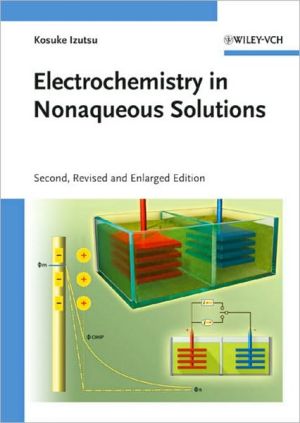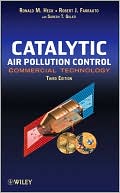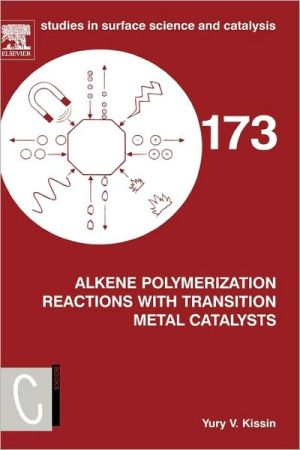Search in google:
Water is the most commonly solvent, but this can be problematic in some aspects of chemistry. The use of Nonaqueous solvents allows substances which may otherwise be unstable or insoluble in water to be reacted successfully. This second edition of a classic monograph has been updated and contains new material on environmentally-friendly solvents, such as room-temperature ionic liquids.Split into three, well-structured parts covering the fundamentals, the latest developments in the techniques and applications in this field and the electrochemistry in new solvent systems.This is the ultimate resource for all graduates students and researchers using electrochemical techniques. Booknews Surveys the properties of non-aqueous solvents, the effects of solvents on chemical processes, and electrochemical techniques for studying chemical reactions. Focusing on the chemical information derived, the author describes applications of potentiometry, conductimetry, polarography, and voltammetry in non-aqueous solutions, and examines methods of selecting and purifying the solvents and electrolytes of electrochemical importance. The differences between electrochemical measurements in non-aqueous systems and those in aqueous systems are identified. Topics include solvation and complex formation of ions and behavior of electrolytes, methods of pH measurement, polargraphic reductions of metal ions, and new capacitors using non-aqueous solutions. Annotation c. Book News, Inc., Portland, OR (booknews.com)
Pt. 1 Fundamentals of Chemistry in Nonaqueous Solutions: Electrochemical Aspects 11 Properties of Solvents and Solvent Classification 32 Solvation and Complex Formation of Ions and Behavior of Electrolytes 273 Acid-Base Reactions in Nonaqueous Solvents 634 Redox Reactions in Nonaqueous Solvents 89Pt. 2 Electrochemical Techniques and Their Applications in Nonaqueous Solutions 1115 Overview of Electrochemical Techniques 1136 Potentiometry in Nonaqueous Solutions 1717 Conductimetry in Nonaqueous Solutions 2098 Polarography and Voltammetry in Nonaqueous Solutions 2339 Other Electrochemical Techniques in Nonaqueous Solutions 28710 Purification of Solvents and Tests for Impurities 30711 Selection and Preparation of Supporting Electrolytes 32112 Use of Nonaqueous Solutions in Modern Electrochemical Technologies 333Pt. 3 Electrochemistry in New Solvent Systems 35513 Electrochemistry in Clean Solvents 35714 Electrochemistry at the Liquid-Liquid Interfaces 385Index 401
\ From the Publisher"It is a book that demands to be used by the intended audience. It is well built for the job. With an exhaustive list of valuable and highly pertinent references at the end of every chapter, the book is hugely and surprisingly comprehensive for the author's intended purpose and the users' requirements, covering vast tracts of areas of knowledge that we need to possess on nonaqueous solutions. There is little excuse not to buy it." (Current Engineering Practice, 2010)\ \ \ \ \ \ Surveys the properties of non-aqueous solvents, the effects of solvents on chemical processes, and electrochemical techniques for studying chemical reactions. Focusing on the chemical information derived, the author describes applications of potentiometry, conductimetry, polarography, and voltammetry in non-aqueous solutions, and examines methods of selecting and purifying the solvents and electrolytes of electrochemical importance. The differences between electrochemical measurements in non-aqueous systems and those in aqueous systems are identified. Topics include solvation and complex formation of ions and behavior of electrolytes, methods of pH measurement, polargraphic reductions of metal ions, and new capacitors using non-aqueous solutions. Annotation c. Book News, Inc., Portland, OR (booknews.com)\ \







